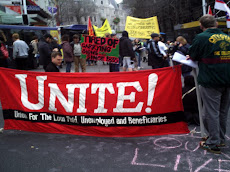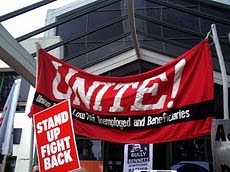Saturday, January 19, 2008
Unite Union Constitution 1998
THE RULES OF UNITE INCORPORATED
1. Name
The name of the Incorporated Society shall be UNITE.
For the purposed of these Rules referred to as "the union".
2. UNITE is a community based union formed to:
(a) to protect and further the interests of members and
working people as a whole by carrying out any policy decided
in accordance of these Rules.
(b) to recruit and organise unorganised workers including
marginal labour, unemployed and beneficiaries.
(c) to secure the best possible working conditions for members
of the Union.
(d) to secure the best standard of living for members
and others unable to be part of the paid work force
due to unemployment, illness, disability, accident,
study or family responsibilities.(e) to assist any other union, federation, movement or
organisation for the betterment of the working conditions,
remuneration and/or welfare of its members or working
people as a whole.
(f) to affiliate to any other union, federation, movement or
organsiation for the furtherance of the objects of the Union.
(g) to prudently invest any surplus funds of the Union to
increase the resources available for use as specified in
parts (a) to (d) of this Rule.
(h) to uphold the principles of the Maori version of the Treaty
of Waitangi including that of tino rangatiratanga in all its work.
3. Membership:
(a) Membership of the Union is open to any worker whether
employed, self employed or unemployed; casual or part-time;
forced or slave labour (including prisons and workfare),
sufferingfrom illness, accident or disability; caring for
family members; or in unpaid or voluntary work.
(b) Any person described in 3 (a) may become a member on
making an application on the appropriate form to the Secretary or
her/his representative.
See the rest at: http://unzconst.blogspot.com/









